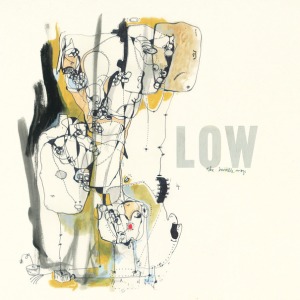There’s mystery in music, and in Low’s music especially. The passage of invisible time doesn’t deepen the mystery, but it does add more layers to it. The new record by Low, “The Invisible Way” (Sub Pop, 2013), seems weary to me, a “letting go” kind of record. As if the weight of the passing years is finally pressing down on this band’s output, compressing it into introspection. Doing anything for a couple of decades can begin to weigh heavily, and it can change a person’s outlook, change a person’s self-image. How many miles have Alan Sparhawk and Mimi Parker logged in service to their art, to their songwriting? How many heartfelt messages have been written down and labored over in the studio, and then sent out into the world? How many nights in dark bars and clubs have they set up their gear and sent out their waves of sound over audiences? It’s been a long journey. Now, here, on this record, the band seems to be saying “We’re hanging on, but something’s different, something’s changing.”
Low is currently on the road supporting their new record. I saw them play at the Crocodile in Seattle at the beginning of April, and they still have a powerful stage presence for a three-piece veteran touring band doing what they do best. As a band playing live, Low recreates, amplifies, and even intensifies of their studio work. Songs from “The Invisible Way” became living things, the band reading each other and flowing with each other.
The 11 songs on this new record (and the four additional tracks on “The Visible End” CD that accompanies Sub Pop’s “Loser” edition of this LP) all carry a weariness at their centers. Low has always stripped their music down to essentials, allowing their sparse lyrics to sit emotionally at the center of their sound. So even when they’ve been riotously happy, if they’ve ever been riotously happy in any of their songs, their lo-fi style has always made them seem more sombre than most. The result on “The Invisible Way” is a cohesive group of songs that, each in their own way, in spare lyrics and song structures, explores the cost of passing time on human lives.
Listening to this record I thought about William Boyd’s novel Any Human Heart, and something the protagonist, Logan Mountstuart, says as an old man as he reflects on his long life, his successes and his failures: “That’s all your life amounts to in the end: the aggregate of all the good luck and the bad luck you experience.” These 11 songs, when taken together, seem to be saying everything happens by chance, and that everything is always changing, all the time, and you just have to hang on and go with it. These aren’t songs about happy endings, but neither are they saying it isn’t worth it to be here living the life. They’re about accepting what you get the best you can. We might all want transcendence, or miracles, or freedom, but just wanting something won’t make it happen. Nor does getting it make our lives better. Maybe these songs all come down to the nature of desire and its traps.
This could be a formula for a depressing record. But, as I said at the outset, there’s mystery in this music. Songs like “Holy Ghost” speak to how we use faith in invisible forces to find (tenuous, at best) footholds in life. Or “Waiting,” with its admittedly childlike hoping that behind life’s sorrows will be answers, the right answers, yet it’s probably better not to think about what’s really wrong too much. You might not want to know what you want to know. Or perhaps the most directly pleading, “Just Make It Stop,” for whatever it is that’s breaking our hearts or crushing our spirits.
Sparhawk and Parker switch off on lead vocals on songs, and their voices are rich and honest in these introspective stories. There’s a further mystery in the fact that this record was produced by Jeff Tweedy. When I heard that Tweedy was involved, I wondered how his role would change the Low sound. Having listened to this record several times now, and especially when comparing it to Low’s “C’mon” (Sub Pop, 2011), I hear a logical progression in this band’s development rather than a major shift into a new sound. “The Invisible Way” seems more cohesive to me as a set of songs, and perhaps it’s a little quieter, if it’s possible for Low to be developing into quieter. In other words, I think Tweedy did a fine job folding into the band’s natural evolution, and at the same time helped them to develop a richer studio sound. Tweedy did this without his style creating confusion, which makes him the perfect pilot.
So many artists are exploring these times we’re living in, a time of confusion and doubt and fear. If there’s a recovery of any kind happening right now, we’re not all equally sharing in it. The opening track, “Plastic Cup,” says is all. That which is the most pedestrian about modern life, a plastic drinking cup with all its base uses, will likely one day be dug up by archaeologists and be mistaken for a cup of kings.
Every age probably feels its time is the most mysterious of all, the most in need of a big windfall or shift in energy or faith to turn things around. Maybe the perception of mystery is the biggest mystery of all. This is a brave new record by a brave veteran band. “The Invisible Way” makes it feel like something has changed, if only in music.


